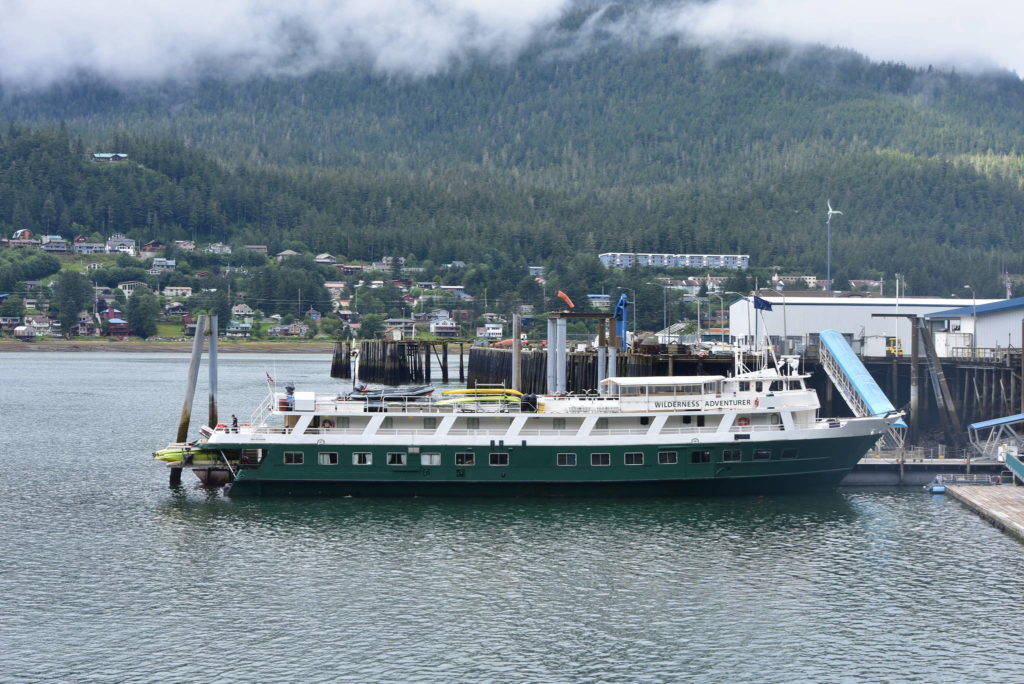An announcement by the Canadian government prohibiting cruise vessels with more than 100 passengers until next year was met with deep discontent from Alaska’s congressional delegation.
“As the state with the most extensive shared border with Canada, the Alaska Delegation has worked in good-faith to seek compromise over border crossing restrictions due to COVID-19, keeping in mind the health and safety of Alaskans and Canadians,” said Sen. Lisa Murkowski, Sen. Dan Sullivan and Rep. Don Young, all Republicans, in a joint statement. “Canada’s announcement to ban all cruise sailings carrying 100 people or more traveling through Canadian waters, without so much as a courtesy conversation with the Alaska Delegation, is not only unexpected — it is unacceptable — and was certainly not a decision made with any consideration for Alaskans or our economy. We expect more from our Canadian allies.”
[Alaska Science Forum: Were blue beads in the tundra the first U.S. import from Europe?]
The ban, in effect as written until Feb. 28, 2022, effectively denies all large-deck cruise ship tourism, a key part of the economy of Southeast Alaska. While some smaller-vessel oriented companies like UnCruise would still be able to operate, the ban would have a dire effect on the economy of the region.
“Upon hearing the announcement, we immediately reached out to Canadian and American agencies to try to understand the rationale behind this decision — particularly the duration of the ban,” the delegation said in the statement. “We are exploring all potential avenues, including changing existing laws, to ensure the cruise industry in Alaska resumes operations as soon as it is safe. We will fight to find a path forward.”
Obstacles and workarounds
While large-deck cruise tourism is denied, failing a reinterpretation or suspension of the Passenger Vessel Services Act, small-deck cruises, such as UnCruise’s sailings, are still going forward, said CEO Dan Blanchard in a Friday morning news conference Friday morning.
“Alaska, here we come. UnCruise is gonna be there,” Blanchard said. “The news yesterday is obviously devastating for our home state. Many of my friends own small businesses that are attached to the cruise industry that will go a second year with zero revenue. It’s shaking the boots of the industry.”
UnCruise’s vessels are U.S. built, flagged and crewed, and have fewer than 100 passengers, meaning that the law preventing large-deck cruises doesn’t apply to them. However, Blanchard said, the company supports measures to ease those laws for the time being.
“UnCruise would support a short term suspension on the Jones Act. We need the big ships in the Alaska,” Blanchard said. “I think it has the potential but whether it has the political will is questionable.”
UnCruise expects about 5,000 passengers for 2021 operations in Alaska spread across six operating vessels with ceilings on capacity to maintain safe space, Blanchard said. Blanchard also detailed extensive, multilayered measures in terms of testing and doctrine to keep sailings safe. The lessons learned in an abortive 2020 sailing were well-learned and applied to develop more flexible and incisive operational policy, Blanchard said.
“We’re seeing families booking. We’re seeing singles booking. We’re seeing couples booking. As soon as people get vaccinated they’re picking up the phone,” Blanchard said. “We do have space in May that we’re keeping open running at a lower percentage. Seventy-five percent. As we go towards June we’re opening up to about 90 percent.”
With fewer people expected to travel to Alaska on cruises, Alaska Airlines is keeping an eye on the situation, said spokesperson Tim Thompson in an email. The airline is cautiously optimistic about the summer, Thompson said, and is able to scale capability to transport tourists to the state as needed.
“I just want to express how sad this is. Us as an industry, this is just devastating,” Blanchard said. “This is the worst freaking news we could have. There are people that are relying on the cruise industry. There are mouths that need to be fed. We need to get our industry started up, gang.”
• Contact reporter Michael S. Lockett at (757) 621-1197 or mlockett@juneauempire.com.

